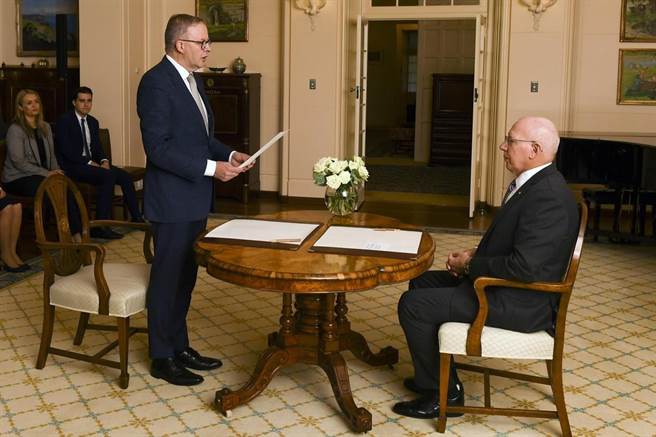5月21日,澳洲举行了联邦选举,选出了所有151名眾议院议员和76名参议院议员中的40名。自由国家联盟(保守派或中右翼)未能连续第4次赢得选举,工党(中左翼)领袖艾班尼斯取代自由党领袖莫里森担任总理。
作为西方主要民主国家之一、台湾的重要贸易伙伴,以及在亚洲地区安全中扮演越来越重要的角色,澳洲的选举结果将对台湾产生多方面的影响。由于「中国因素」,亚洲、欧洲和美国的许多其他国家都非常关注这次选举。
就像去年9月加拿大的大选结果,以总理杜鲁道为首的在任自由党(中左翼政党)再次赢得足够的席位,但只能组成少数政府。那些支持莫里森反中政策(与川普政府的政策一致)者的失望是可以理解的,他们也对新任总理艾班尼斯领导下的澳洲对华政策感到忧心。
加拿大大选后,笔者为《中国时报》撰文评论台湾政府如何在加拿大大选前採取多项公开行动,表明对加拿大保守党的支持。换句话说,台湾曾押宝加拿大的保守党会赢得选举。儘管执政的民进党和加拿大保守党在社会问题、气候变化或新冠防疫政策上几乎没有共同之处,但台湾政府希望保守党赢得加拿大大选完全是基于中国问题。在这方面,台湾对加拿大的策略与对美国的策略类似,台湾政府与民进党对美国的战略已经接近保守的共和党,儘管除了在中国问题外几乎没有共同点。
毫不奇怪,对澳洲,台湾也採取了类似的策略。儘管民进党和自由国家联盟在除中国以外的大多数问题上存在显着分歧,但台湾的行动表明了对保守的自由国家联盟赢得选举的偏好。
2017年,台湾与澳洲自由国家联合政府签署秘密协议,为在诺鲁被拘留的寻求庇护者提供医疗服务,以防止这些被拘留者在澳洲寻求医疗服务。儘管这一安排的许多细节仍不得而知,但媒体和非政府组织对台湾参与的批评很多,也不清楚台湾得到了什么回报。
2020年,自由国家联盟的前总理腾博通过视讯会议在「玉山论坛」上发表演说,2021年,自由国家联盟前总理艾伯特访问台北,在「玉山论坛」上公开演说。儘管他们的露面细节没有像美国前国务卿蓬佩奥那样向媒体泄露,但腾博和艾伯特支持台湾的言论与他们担任总理时的言行大相径庭。
同样在2021年,儘管民进党政府反对在台湾使用核电,但台湾政府仍肯定美英澳三方安全伙伴(AUKUS)协议让澳大利亚购买核动力潜艇。
选举当天,台湾外交部发推特恭喜艾班尼斯,但在同一个推特感谢莫里森。这样有点失礼,也明显表示台湾政府很失望。 应该分开表达,一个恭喜艾班尼斯, 另外发一个感谢莫里森。
澳洲新政府是否会寻求与台湾更紧密的关系,或者台湾政府对自由国家联盟的热情是否会影响双边关系的发展,还有待观察。有几个潜在的行动需要注意。
时任国防部长杜登在2021年表示,如果台海发生战争,「若美国出兵保卫台湾,而澳洲却不加入军事行动,将是不可思议的事」。当时的影子外交部长黄英贤立即批评杜登背离了美国「战略模糊」的政策。即使是拜登总统有时也会脱离「战略模糊」,澳洲新政府的政策应该引起台湾的关切。
澳洲是《跨太平洋伙伴全面进步协定》(CPTPP)的成员,但新政府是否会积极倡导台湾加入CPTPP尚不得而知。
澳洲新政府已承诺任命澳洲首任原住民族无任所大使。一个大胆的举动是派这位大使参加台湾的相关活动,例如南岛民族论坛。
如果澳洲新政府不积极採取行动支持台湾,要责备艾班尼斯总理很容易,但台湾也需要承担一些责任。(作者为美国共和党前亚太区主席)
Taiwan Disappointed by Labor Party Victory in Australia
By Ross Darrell Feingold
Former Asia Chairman Republicans Abroad
Twitter: @RossFeingold
On 21 May 2022 Australia held its federal election to elect all 151 members of the House of Representatives and 40 out of the 76 members of the Senate. The Liberal-National (the conservative, or right of center) coalition failed to win a fourth consecutive election, and Labor Party (left of center) leader Anthony Albanese has replaced Liberal Party leader Scott Morrison as prime minister.
As one of the major western democracies, an important trading partner for Taiwan, and with an increasingly important role in regional security in Asia, Australia’s election result will affect Taiwan in many ways. Due to the “China factor”, many other countries in Asia, Europe, and the United States paid close attention to this election.
Like the results of Canada’s election last September in which the incumbent Liberal Party (Canada’s left-of-center party) led by Prime Minister Justin Trudeau again won a sufficient number of seats to only form a minority government, those who supported Scott Morrison’s robust China policies (which were consistent with the Trump Administration policies) are understandably disappointed and are concerned about Australia’s China policy under new Prime Minister Albanese.
Following Canada’s election, this author wrote a commentary for The China Times that discussed how the Taiwan government had taken several public actions prior to Canada’s election that demonstrated its support for Canada’s Conservative Party. In other words, Taiwan had wagered (押宝, yābǎo) that Canada’s Conservative Party would win the election. Notwithstanding that the ruling Democratic Progressive Party and Canada’s Conservative Party share little in common on social issues, climate change, or COVID-19 policy, the Taiwan government’s hope that the Conservative Party would win Canada’s election was based solely on China issues. In this regard, Taiwan’s strategy in Canada was similar to its strategy in the United States, where the Taiwan government and the Democratic Progressive Party have become close to the conservative Republican Party, despite having little in common other than on China issues.
It is no surprise that in Australia, Taiwan pursued a similar strategy. Taiwan’s actions demonstrated a preference for the conservative Liberal-National coalition to win the election, despite the significant differences between the Democratic Progressive Party and the Liberal-National coalition on most issues other than China.
In 2017, Taiwan signed a secret agreement with Australia’s Liberal-National coalition government to provide medical treatment for asylum seekers detained on Nauru, so as to prevent these detainees from seeking medical care in Australia. Although many details of this arrangement remain unknown, there was much media and non-government organization criticism of Taiwan’s participation, and it is unclear what benefit Taiwan received in return.
In 2020, former Liberal-National prime minister Malcolm Turnbull spoke to the Yushan Forum via videoconference, and in 2021, former Liberal-National prime minister Tony Abbott visited Taipei to speak at the Yushan Forum. Although details of their appearances were not leaked to the media as what happened with former United States Secretary of State Mike Pompeo, both Turnbull and Abbott’s comments in support of Taiwan differed significantly from what they said or did as prime minister.
Also in 2021, the Taiwan government expressed its enthusiasm for the AUKUS agreement under which Australia will acquire nuclear powered submarines, despite the Taiwan government’s opposition to the use of nuclear power in Taiwan.
As if to underscore Taiwan's disappointment that Morrison will no longer be prime minister, Taiwan's Ministry of Foreign Affairs tweeted its congratulations to Albanese, but in the same tweet, thanked Morrison for his support, rather than separately tweet a congratulations to Albanese and a thank you to Morrisoin.
It remains to be seen whether Australia’s new government will seek a closer relationship with Taiwan or if the Taiwan government’s enthusiasm for the Liberal-National coalition will affect bilateral relations going forward. There are several potential actions to watch for.
When then-Defence Minister Peter Dutton said in 2021 “It would be inconceivable that we wouldn’t support the US in an action if the US chose to take that action” if there is a war in the Taiwan Strait, then-shadow foreign minister Penny Wong quickly criticized Dutton for departing from the US policy of “strategic ambiguity”. With even President Biden sometimes departing from “strategic ambiguity”, the new Australian government’s policy should be a concern for Taiwan.
Australia is a member of the Comprehensive and Progressive Agreement for Trans-Pacific Partnership, but it is unknown whether the new government will enthusiastically advocate for Taiwan’s CPTPP membership.
The new Australian government has committed to appointing Australia’s inaugural First Nations Ambassador. A bold action would be to send this ambassador to attend relevant events in Taiwan such as the Austronesian Forum.
If the new Australian government fails to take enthusiastic action to support Taiwan, it will be easy to blame Prime Minister Albanese, though some blame will also need to be borne by Taiwan.
※以上言论不代表旺中媒体集团立场※

发表意见
中时新闻网对留言系统使用者发布的文字、图片或檔案保有片面修改或移除的权利。当使用者使用本网站留言服务时,表示已详细阅读并完全了解,且同意配合下述规定:
违反上述规定者,中时新闻网有权删除留言,或者直接封锁帐号!请使用者在发言前,务必先阅读留言板规则,谢谢配合。